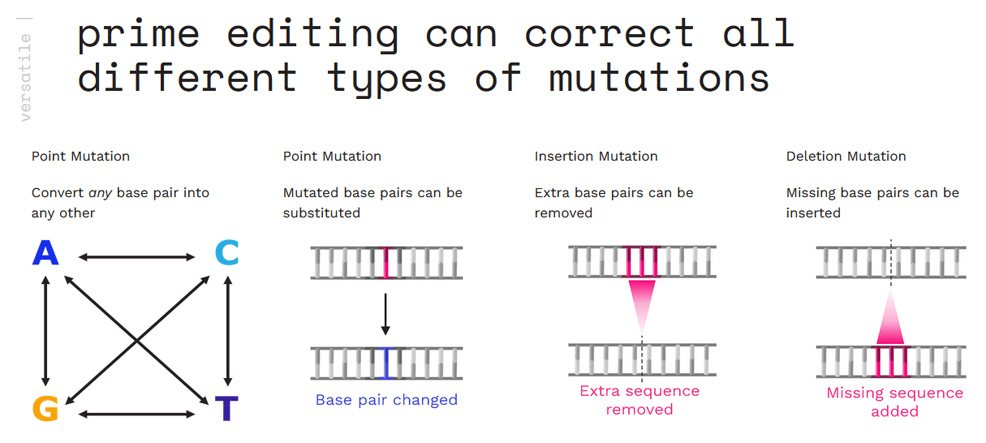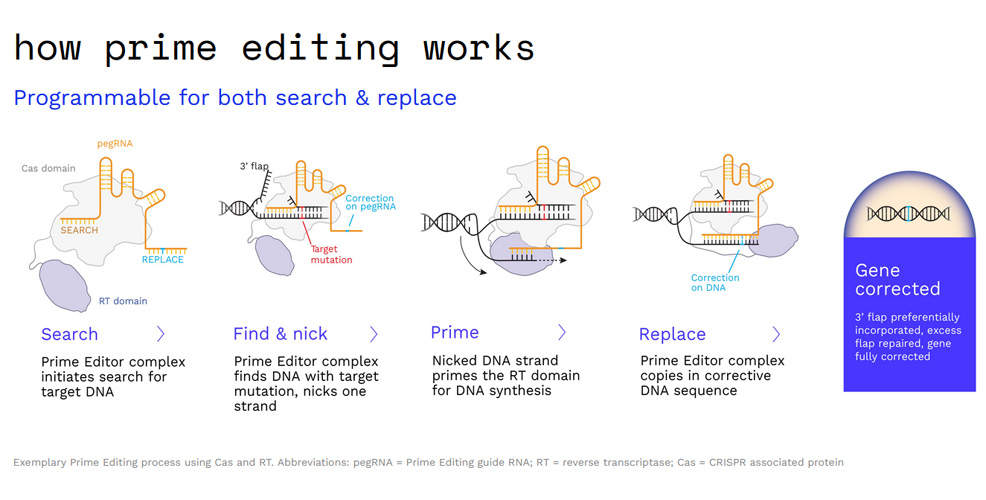
18th July 2021 $315m biotech company emerges from stealth Prime Medicine, a company with a powerful new gene editing technique, this week announced its official launch with $315 million in financing.
"Prime Editing is a wonderful example of the revolution in genetic medicine that we are living through," said Robert Nelsen, co-founder and Managing Director of ARCH Venture Partners, one of several companies to fund Prime Medicine. "Gene editing technologies like this, when mature, could totally change our conception of what's possible in treating disease." "This is an opportunity to take a giant step toward cures for a much wider range of diseases than previously possible," said Stephen Knight, President and Managing Partner of F-Prime Capital, another backer of the new company. The funds raised will be used to continue building the company, expand the capabilities of its technology platform and rapidly advance towards clinical indications. By the end of 2021, Prime Medicine expects to employ more than 100 people full-time. Prime Medicine's new technique – Prime Editing – is a next-generation gene editing technology that acts like a DNA word processor to "search and replace" disease-causing genetic sequences at their precise location in the genome, without resulting in double-strand DNA breaks that cause unwanted cellular changes. This method is highly versatile, with potential to address more than 90% of known disease-causing mutations, and works in a variety of dividing and non-dividing primary human cells, as well as in animals. Prime Editing has been shown by multiple independent laboratories to perform genome edits with very high fidelity, making edits precisely at the desired location with minimal or no editing in other parts of a genome. Together, these features overcome several technical barriers attributed to earlier gene editing technologies.
A study describing Prime Editing's ability to "search and replace" to restore normal genetic function almost anywhere in the genome first appeared in the journal Nature in 2019. The technology immediately and widely achieved recognition as a major advance in gene editing, with the potential to overcome fundamental barriers that have prohibited existing gene editing approaches from addressing many genetic diseases. Since then, Prime Editing has been validated in numerous laboratories around the world and dozens more peer-reviewed articles. While using methods similar to precursor technologies, such as CRISPR and base editors, it has the major advantage of DNA mismatch repair. This avoids the generation of unwanted and random insertions or deletions which complicate the retrieval of cells carrying the correct edit. CRISPR makes double-strand cuts, which can be lethal to cells, requiring non-homologous end joining (NHEJ) or homology-directed repair (HDR) to fix the DNA breaks. By contrast, Prime Editing snips only a single strand of double-helix DNA.
"Prime Editing represents an opportunity to do what no gene editing approach has yet been capable of – correcting nearly all types of pathogenic gene mutations, correcting multiple mutations at once, and bringing durable cures to patients across multiple disease areas, potentially with a single 'once and done' treatment approach," said David Schenkein, General Partner at GV, another financial backer. "We are tremendously excited about the potential of this technology, and about the talented team at Prime working to bring it to patients." The scientific founders of Prime Editing – David Liu, PhD, and Andrew Anzalone, PhD – both hail from the Broad Institute of MIT and Harvard. Dr. Anzalone originally conceived of Prime Editing and brought it to Dr. Liu's laboratory, where it was then developed further. Dr. Anzalone is now advancing the technique as Head of Prime Editing Platform at Prime Medicine. The company is progressing with multiple drug discovery programs targeted at liver, eye, ex-vivo hematopoietic stem cell, and neuro-muscular indications. Human clinical trials are expected to follow in the next few years. "Prime Editing is a transformative technology that we believe will make a significant impact by addressing the fundamental causes of genetic disease," said CEO of Prime Medicine, Keith Gottesdiener. "Since Prime began operations in the summer of 2020, we have continued to make great progress in advancing the performance of Prime Editing, which allowed us to close our Series B financing nine months later. We are operating from a position of financial strength, and look forward to further developing the technology and progressing our preclinical programs toward the clinic, with the hope that they may cure or halt the progression of genetic diseases for patients."
Comments »
If you enjoyed this article, please consider sharing it:
|









